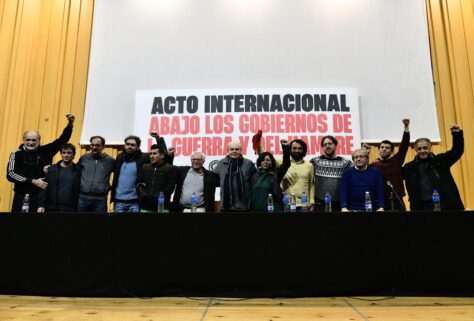English
5/7/2024
Resolution on Turkey

Seguir
Movilización del 1° de mayo
The Erdogan regime systematically continues to put pressure on the opposition forces of society. We experienced one of the latest examples of this, and one of the biggest waves of arrests in recent years, during the Mayday protests this year.
Almost 200 people were detained during and after the Mayday clashes. This situation occurs every year; detainees are usually released. But this time, 82 people were imprisoned among those detained, including 4 of our comrades. Of those imprisoned so far, 30 people have been released, including 2 of our comrades. Our comrade Demet is the leader of İstanbul branch and also a professional worker of DİSK (The Confederation of Revolutionary Trade Unions of Turkey); and the other comrade Burak is a railway worker and active member of BTS (United Trade Union of Transport Employee).
In addition, in the police indictment, Marxist Thought Society, which is our youth work at Bosphorus University, was targeted because it was actively prominent in the protests that took place at the university before.
We see these arrests as a warning sign that the regime wants to give a warning against street protests that may arise in the face of the deepening economic crisis and austerity measures that the Erdogan regime started to impose.
In addition, dissidents, especially the socialist left, are under systematic pressure due to their social media posts or speeches.
Kurdish Politicians
Another political case that was on the public agenda in Turkey was the case that resulted in heavy penalties against Kurdish politicians. Important Kurdish politicians such as Selahattin Demirtaş and Figen Yüksekdağ, who are ex-co-leaders of pro-Kurdish - HDP (People’s Democratic Party), have been held in prison since 2016 due to the 6-8 October Kobane Protests that took place in 2014 and resulted in the death of 37 people.
Last month, the court sentenced Selahattin Demirtaş to 42 years and Figen Yüksekdağ to 30 years and 3 months in prison; and also many other Kurdish politicians were sentenced to heavy prison charges.
Regarding the attacks on the Kurdish political movement, it is necessary to mention the appointment of trustees to municipalities in Kurdish cities.
Last term (after the 2019 local election), the government appointed trustees to almost all municipalities controlled by the Kurdish national movement. After the March 2024 local election, they wanted to give the election to the second-ranked AKP candidate instead of Abdullah Zeydan, who was elected as the Mayor of Van, one of the cities where the DEM Party received the most votes. However, the regime was forced to step back due to the strong public reaction and the falsehood of the allegations about Abdullah Zeydan.
Last month, a trustee was appointed to Hakkari Municipality, which is located at the intersection of the borders of Iran, Iraq, and Turkey, and where the PKK was once very strong. The mayor was also jailed.
There is a strong possibility that in the future the government will seize control of the municipalities under the control of the Kurdish national movement by creating various excuses. Erdogan's regime, for a long time, has wanted to start an operation on the PKK-controlled territory in Iraq. If they can find a chance, the regime in Turkey will likely harden over the Kurdish issue.
Gezi Resistance Case
Another important political case in Turkey is the case of the Gezi Resistance. TİP (Workers’ Party of Turkey) MPs Can Atalay and some other political prisoners were sentenced to 18 years in prison on the charge of overthrowing the government by using force and violence.
Economic Situation and Condition of Working Class
Turkey did not change its place this year and ranked 10th in the Worst Countries for Workers list published by the International Trade Union Confederation. The top ten countries are as follows: Bangladesh, Belarus, Ecuador, Egypt, Eswatini, Guatemala, Myanmar, Philippines, Tunisia.
One of the common features of these countries is that they provide labor for sectors that do not require skilled labor such as textile, construction, and services for international capital. Capital in Turkey has been complaining about the high cost of labour for a long time (the minimum wage corresponds to an average of 500 dollars). To stand out in the export race, it demands that the valuable TL policy be abandoned and minimum wage increases be stopped. The government announced that there will be no second increase in the minimum wage this year.
One of the biggest victims of the cheap labour hell in Turkey is migrant workers. Migrant workers often work unregistered and in the most insecure jobs. Recently, wherever there is a work accident or workplace murder, it has become quite common to encounter the death of an illegal immigrant worker. Also some far-right elements use the migrants as the scapegoat for the economic crisis and in near future they raised their popularity.
Official data says that 14 percent of workers are unionized, and the rate of workers who can make a collective bargaining agreement is around 8 percent. This situation reveals how defenseless the working class in Turkey is against the attacks it faces.
It should also be said that recently, especially after the presidential elections last year, with the Erdoğan regime starting austerity measures, unemployment data have reached a historical peak. Today, broadly defined unemployment reached 27.2%, exceeding the pre-pandemic period.
In summary, the popularity of Erdogan, who has been in power for 22 years in Turkey, is about to melt away because of the social contradictions and the regime is increasing its harshness against the working classes and the opposition. Until now, Erdogan consolidated his power by using cultural and religious polarisation inside society; but as the economical crisis deepens his social base, which is mainly consisting retired peoples, poor conservative workers and some liberal element is disintegrating.
But we know that only the class movement can be successful to end the Erdogan era and prevent ruling classes to persuade people the “moderate, normalised Erdogan regime”.



